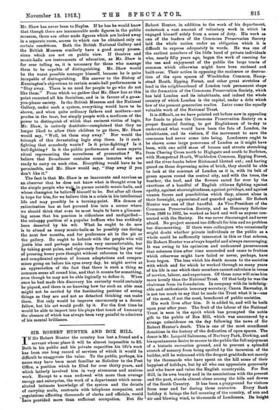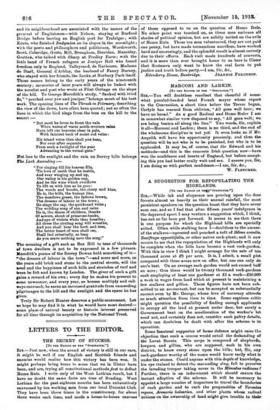SIR ROBERT HUNTER AND BOX HILL.
IN Sir Robert Hunter the country has lost a friend and a servant whose place it will be almost impossible to fill. Both in his public and his private capacities his life's work has been one long record of services of which it would be difficult to exaggerate the value. To the public, perhaps, his name may have been most familiar as Solicitor to the Post Office, a position which be filled for over thirty years, and which latterly involved him in very strenuous and anxious work. Except to a man endowed with more than average energy and enterprise, the work of a department which neces- sitated intimate knowledge of the system and the details of carrying mails, contracts with telephone companies, and regulations affecting thousands of clerks and officials, would have provided more than sufficient occupation. But Sir
Robert Hunter, in addition to the work of his department, undertook a vast amount of voluntary work in which he engaged himself solely from a sense of duty. His work as one of the leaders of the Commons Preservation Society laid the whole nation under an obligation which it is difficult to express adequately in words. He was one of the earliest members of the little band of private individuals who, nearly fifty years ago, began the work of rescuing for the use and enjoyment of the publics the large tracts of common which otherwise might have been enclosed and built over. Their action in opposing the enclosure or destruc- tion of the open spaces of Wimbledon Common, Hamp. stead Heath, Epping Forest, and other great stretches of land in the neighbourhood of London took permanent shape in the formation of the Commons Preservation Society, whick has laid London and its inhabitants, and indeed the whole country of which London is the capital, under a debt which few of the present generation realize. Later came the equally valuable work of the National Trust.
It is difficult, as we have pointed out before now in appealing for funds to place the Commons Preservation Society on a proper financial footing, to get Englishmen of to-day to understand what would have been the fate of London, its inhabitants, and its visitors, if the movement to save the commons had never come into being. Londoners ought to be shown some large panorama of London as it might have been, with one solid mass of houses and streets stretching from Charing Cross north to Highgate and south to Surbiton, with Hampstead Heath, Wimbledon Common, Epping Forest, and the river-banks below Richmond blotted out ; and having gazed on those depressing miles of brick, they should be able to look at the contrast of London as it is, with its belt of green spaces round the central city, and with the trees, the heather, the turf, and the flowers saved for ever by the exertions of a handful of English citizens fighting against apathy, against shortsightedness, against privilege, and against unseen forces and possibilities which they, almost alone in their foresight, appreciated and guarded against. Sir Robert Hunter was one of that handful. As Vice-President of the Commons Preservation Society, and as Honorary Solicitor from 1868 to 1882, he worked as hard and well as anyone con- nected with the Society. He was never discouraged and never afraid. No project seemed too difficult for him and no problem too disconcerting. If there were colleagues who occasionally might doubt whether private individuals or the public as a whole could be sufficiently interested in this or that scheme, Sir Robert Hunter was always hopeful and always encouraging. It was owing to his optimism and undaunted perseverance that schemes time after time succeeded and came to fruition which otherwise might have failed or never, perhaps, have been begun. The loss which his death means to the societies with which and for which he worked through so many years of his life is one which their members cannot calculate in terms of service, labour, and experience. Of these none will miss him more keenly than the National Trust. Of that body he was the chairman from its foundation. In company with its indefatig- able and enthusiastic honorary secretary, Canon Rawnsley, it is not too much to say that he made the Trust what it is—one of the most, if not the most, beneficent of public societies.
His work lives after him. It is added to, and will be built upon year after year. The fruit of the labour of the National Trust is seen in the spirit which has prompted the noble gift to the public of Box Hill, which was announced by a strange coincidence on the day following the news of Sir Robert Hunter's death. This is one of the most munificent donations in the history of the dedication of open spaces. The donor is Mr. Leopold Salomons, of Norbury Park, Dorking, and his spontaneous desire to secure to the public the full enjoyment of a historic recreation ground, and to prevent a splendid stretch of scenery from being spoiled by the incursion of the builder, will be welcomed with the deepest gratitude not merely by the thousands who have spent on the hill some of their happiest of holidays, but by all who can appreciate generosity and who know and value the English countryside. For Box Hill, in its own beauty and in its associations with the present and the past, stands almost alone among the hills and downs of the South Country. It has been a playground for visitors from near and far during three centuries. Every Bank holiday it brings the full meaning of the country, of sun and air and blowing wind, to thousands of Londoners. Its height and its neighbourhood are associated with the names of the greatest of Englishmen—with Nelson, staying at Burford Bridge before leaving an English port for Trafalgar; with Keats, who finished Endyntion on its slopes in the moonlight ; with h the poets and philosophers and politicians, Wordsworth, Scott, Coleridge, Grote, Mill, Brougham, Sheridan, Macaulay, Grattan, who talked with Sharp at Fredley Farm; with the little band of French refugees at Juniper Hall who found freedom only in England, Talleyrand, de Narbonne, Madame de Stael, General d'Arb]ay, the husband of Fanny Burney, who stayed with her friends, the Locks, at Norbury Park itself. Those names belong to the early years of the nineteenth century ; memories of later years will always be linked with the novelist and poet who wrote at Flint Cottage on the slope of the hill. To George Meredith's study, " flanked with ivied fir," "perched over yew and juniper," belongs mach of his best work. The opening lines of The Thrush in February, describing the view of the down, have often been quoted ; not so often the lines in which the bird sings from the tree on the hill to the sunset :-
" But most he loves to front the vale When waves of warm south-western rains Have loft our heavens clear in pale, With faintest beck of moist red veins :
His island voice then shall you hear, Nor ever after separate
From such a twilight of the year Advancing to the vernal gate."
Not less to the sunlight and the rain on Surrey hills belongs The Lark Ascending :-
" For singing till his heaven fills,
'Tis love of earth that he instils,
And ever winging up and up, Our valley is his golden cup,
And he the wine which overflows To lift us with him as he goes:
The woods and brooks, the sheep and line, He is, the hills, the human line,
The meadows green, the failows brown, The dreams of labour in the town ; He sings the sap, the quickened veins The wedding song of sun and rains He is, the dance of children, thanks Of sowers, shout of primrose-banks, And eye of violets while they breathe; All these the circling song will wreathe, And you shall hear the herb and tree, The better heart of men shall see,
Shall feel celestially, as long
As you crave nothing save the song."
The meaning of a gift such as Box Hill to tens of thousands • f town dwellers is not to be expressed in a few phrases.
Meredith's poems of the Surrey Downs hold something of it- ' the dreams of labour in the town "—and more and more, as the years add brick and stone to the ,central streets, will the need and the happiness of such bills and stretches of turf and frees be felt and known by London. The giver of such a gift gains a reward of his own; every day he makes his present to some newcomer, and every year, as houses multiply and rail- ways encroach, he earns an increased gratitude from succeeding pilgrimages to the hill and the sunlight and the space he has given.
Truly Sir Robert Hunter deserves a public monument. Let ns hope he may find it in what he would have most desired— some place of natural beauty or historic interest preserved for all time through its acquisition by the National Trust.































































 Previous page
Previous page